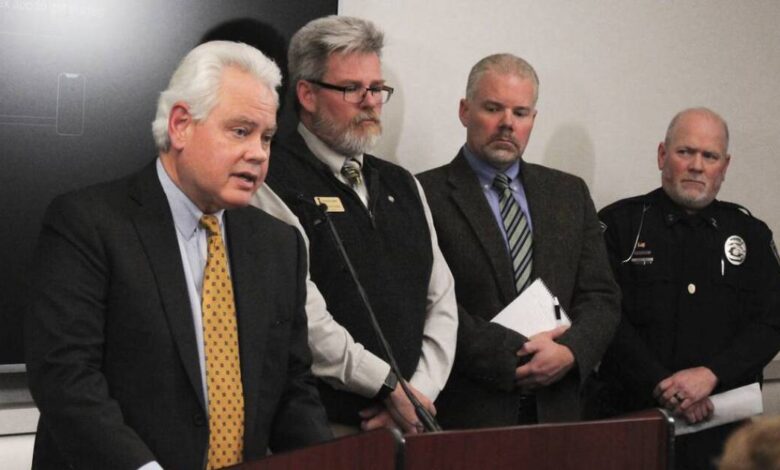How U. of Idaho Leadership Is Responding to a Quadruple Homicide

When Torrey Lawrence joined the University of Idaho 25 years ago, he couldn’t have imagined the traumatic loss the campus would suffer last month. Lawrence, now the provost and executive vice president, has always thought of Moscow, Idaho, as a safe community for students and families.
But the stabbing deaths of four Idaho students on November 13 in their home near campus has shattered that sense of safety. The police have yet to identify a suspect or a motive, and few details from their investigation have been released, leaving many students confused and afraid.
Earlier this week, Lawrence joined the university community in a vigil to mourn the lives of the four victims: Ethan Chapin, 20; Kaylee Goncalves, 21; Xana Kernodle, 20; and Madison Mogen, 21.
The past couple of weeks have been difficult, Lawrence said in an interview. Part of his job as provost, responsible for all academic programs and institutional services, has been to make the best decisions on how to finish the semester and plan for the next, considering how the community is healing.
Lawrence spoke this week with The Chronicle about his experience as a leader navigating the tragedy and how the university is adapting to accommodate the community’s needs. The interview has been edited for length and clarity.
When did you first hear about the crime?
I was at home. It was Sunday, approximately an hour after the police were notified. And we were told there was a homicide scene very close to campus. And we immediately got our leadership team together, knowing that that area is nearly all student apartments. And we got together just so that we could be responsive and be ready for whatever would come, and we were in pretty much constant contact with the police throughout that day as it unfolded.
It was absolutely shocking. Moscow, Idaho, is a very safe community with almost no violent-crime history. When you hear of tragedies, which of course seem to be daily these days, you always think, “I hope this never happens to us.” And we do live in a very safe place. But I think this is a good example where no one is immune to some of this violence.
What were the first couple of days like for you?
For many people in the university, we absolutely stopped what we were doing to focus on this. Those first few days were really focused on a couple of things. One was assisting law enforcement in any way we could. We have aided in the investigation in any way that they have asked us to. We focused on trying to communicate with our faculty, staff, and students about what was happening and what would be happening in the next day or two. And we focused on immediately ramping up our own campus security, as well as our support services such as counseling for students, counseling for employees, making sure people received information they needed as the situation evolved.
We didn’t hold classes on that following Monday out of respect for the students, but also to reconsider what was going to happen in the remaining part of the semester. So we ended up pretty quickly determining that we were going to have to be very flexible with students who would stay in town and those who would go home or go elsewhere. We have a large residential component. Many students live on campus; many of them are international or students who don’t have a home beyond Moscow. This is a moment where, as most universities, you can’t lock the door and shut off the lights and say, “See you in a week.” They live here, they work here, they’re here regardless of what happens. We don’t really shut down in a way that some people think institutions can.
We adjusted our operations and asked faculty to try to the best of their ability to accommodate students who may not be in class. We’ve continued that throughout the rest of the semester. And faculty have been amazing. They have shifted and tried to accommodate those students who are not here because they just wanted to stay home during this time, which we respect. But we also have a lot of students here. A lot of our classes are fairly full. We see students that chose both sides. That’s what we were trying to accommodate — where they can choose what they wanted to do for this period. Of course, the world did this in 2020, and we all learned from it. And I think our faculty has done a great job of taking some of those lessons learned and applying them here to get through the next two weeks.
Now that it has been a few weeks since the crime took place, how is the campus community healing?
People are trying to make sense of it, and that is difficult. There’s definitely an element of sadness and mourning that we are still in. The fact that it happened right before the holiday, it was strange. A number of people had gone home, then we have this week away. And I think people had a chance to take a deep breath. And now coming back, I think the vigil was a key moment moving forward.
You know, we’re never going to forget these four students. While there’s still a lot of sadness, people process a tragedy like this in different ways. We still have additional counseling, we still have additional resources for people, we still have stepped-up safety protocols going. And so we’re just trying to help people get through this in whatever way they need to work through it.
But we’re seeing events restarting. A lot of things were canceled just in honor of the students and to give people a chance to try to work through this, but we’re trying to start to move forward. We’re right now discussing plans for spring.
What are the plans for the rest of the semester? And what is the plan for the spring?
Our last day of classes is December 9, and then we have one week of exams, the 12th through the 16th. So we’ve got two and a half weeks of activity left. In those weeks, we’ve offered the students flexibility that if they needed to be at home, we would try to accommodate them as best we could with some remote options.
We have not done a survey or any kind of head count to know exactly how many students are here because we actually expect it could fluctuate a little bit. But the reports I have from faculty, just asking them when I see them, is that two-thirds, three-quarters of the students seem to be here. And we’re also seeing that same amount in our dorms. So there’s still a significant contingent here. They’re trying to finish the semester the best they can.
We have not made any decisions for the spring yet. We’re working with our leadership team and our Faculty Senate to look at options, trying to brainstorm various ways we could operate in the spring semester. If someone is captured, that might change that planning, but the timing of that also is critical. And we’re looking at how we can be back to normal as much as possible, but also knowing that we may have some students who aren’t ready to return. And we want to try to help them as much as we can.
I expect we will make some decisions next week, so that everybody knows going into the break what that plan is for when they return. We start classes on Wednesday, January 11. So we’ve got six weeks to do that. But again, we want to try to do as much as we can before people leave for the winter break.
Do you plan to continue offering the same increased resources in the spring, including mental-health counseling and campus security?
Absolutely. We’ll continue to reassess that as we go along and make sure we’re meeting the needs. We’ve had a great response from people — they’re very happy with what’s been provided, and I’m very thankful for those resources. We have a full-time counseling center, so they will continue, and they’ve done a great job. We’ve offered support for faculty through our employee counseling, both online and in person. I expect that will continue as long as there’s demand for it. The other resources, we have all the academic supports in place that we had previously. And those will of course continue. And law enforcement and security, I think that will continue as long as needed. We’ll continue to work with law enforcement to assess that along the way, being mindful of people’s concerns about security and safety.
What about the incoming class of new students? How will you build their sense of safety coming onto the campus after this tragedy?
We have a rolling admissions process. We’ve already accepted students; we will continue to accept students through the summer. In fact, we’re meeting about that today and tomorrow. The messaging around the safety of the community, it’s a difficult situation. What I find interesting is what is being noticed in some of the media and certainly by our parents. We’ve had many parents reach out, as well as alumni, actually, who say that the university is handling this very well. They feel like their kids are in good hands, which is a real vote of confidence about what we’re doing in this horrible situation.
I think, at the end of the day, the University of Idaho will be remembered for the way that we handled this. But I think that’ll be part of the messaging to our new students. Our history of safety is very strong. And we’ve shown that we are a caring institution, and we’re very student-focused, and we’re here to support our students and help them be successful.
What advice would you have for other institutions if they ever go through something like this?
I might have more to share in month or two. But I’ll give you two considerations for institutions to think about. One is their planning and process for dealing with emergencies and incidents. There’s not a lot of time to develop what you’re going to do and how you’re going to do it. You need to have those things in place. We, I think, functioned very well, especially in those first few days where timing is so critical, so that you can communicate clearly. You can’t invent this as you go.
The second thing I would suggest is that your relationship with local law enforcement is critical. We have had a longstanding, great relationship with the Moscow Police Department. They’ve had officers assigned to our campus for years. We meet with them regularly. We already have systems for sharing information and dealing with incidents — to the point that I have some of the officers’ cellphone numbers in my phone, and those things mattered. We could communicate quickly and clearly.
The police are focused on finding the person who did this, and we’re assisting them with that, but our focus is just continuing to support our people and help them get through this. And we will get through this.
Source link






